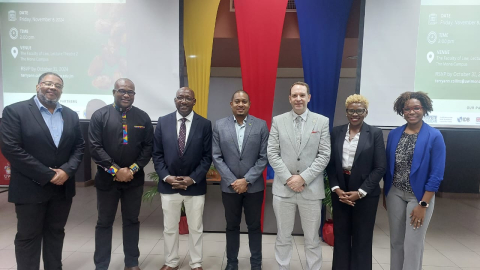
Photo Caption
(L-R): Prof. Michael Taylor, Dean, Faculty of Science and Technology; Prof. Densil A. Williams, Pro Vice Chancellor and Principal, The UWI, Mona Campus; Dr. Howard Reid, Principal Investigator Grow Castor Bean Project – Research and Development Component and Director, Mona Institute of Applied Sciences; Hon. Floyd Green, Minister of Agriculture, Fisheries and Mining; HE Jonathan Cook, Acting British High Commissioner to Jamaica; Ms. Sonja Linton, Vice President Exports, JAMPRO; Mrs. Jodi Graham, Manager, Refinery Production, Petrojam Limited.
Jamaica Castor Industry stakeholders celebrated the development of proposed phenotypic, genetic and physiochemical standards for Jamaican Black Castor Oil (JBCO) at The UWI/Compete Caribbean Jamaica Castor Symposium. The event was hosted at The University of the West Indies (The UWI), Mona Campus on November 8, 2024. It is expected that these standards will form the basis for obtaining a Geographic Indication (G.I.) for JBCO and to accelerate the process of “clawing back” a significant portion of the US$300 million JBCO global market for Jamaican producers.
The symposium was held to share the results of The Grow Castor Bean Project - Research and Development Component which was funded by Compete Caribbean Partnership Facility (CCPF) and executed by The UWI through the Mona Institute of Applied Sciences (MIAS). In addition to developing standards for JBCO, the research team led by Dr. Howard Reid, Principal Investigator and Director of MIAS, also developed Jamaican Cold Pressed Castor Oil (JCPCO) Standards, JBCO hand soaps and high performing organic fertilizers from the waste generated in the production of JBCO and JCPCO.
Dr. Reid’s research team sampled the island to identify over one hundred different types of castor plants in Jamaica. These plants were phenotypically characterised and DNA was then extracted. Additionally, working with colleagues Dr. Sally James and Dr. Alastair Droop from the Bioscience Technology Facility at the University of York, advanced molecular biology techniques were used to discriminate between Jamaican and non-Jamaican strains of castor. Advanced chemistry techniques were also used by the MIAS Research Team to map the chemical parameters of JBCO and JCPCO.
Speaking at the event, Minister of Agriculture, Fisheries and Mining, the Hon. Floyd Green, said “We are on the verge of something truly transformative for Jamaica. This is not just another project, it is a chance for us to reclaim what is rightfully ours and unlock the incredible potential of Jamaican Black Castor Oil. The research happening at the Mona Institute of Applied Sciences is more than just data; it is the key to safeguarding our heritage and securing our place in the global market.”
Principal of the Mona Campus, Prof. Densil A. Williams in his opening remarks highlighted that the work carried out by Dr. Reid and his team emphasized the value of a University. “What Dr. Reid and his team have done is to take our indigenous plants, and identify the critical link to our location and then using that to add value to the global value chain of goods and services. It is the kind of value added support you only get from Universities,” he stated.
Also present the event was His Excellency Jonathan Cook, Acting British High Commissioner to Jamaica, who commented: “It is fantastic that the results of the research done by CCPF, UWI, MIAS and JAMPRO in conjunction with the other stakeholders are being shared today. It is to our mutual advantage for the Caribbean to produce high quality products and services which are competitive in the global market to take full advantage of the CARIFORUM/UK Economic Partnership Agreement.”
JAMPRO’s Vice President for Exports, Ms. Sonja Linton in her remarks affirmed support for the project, stating that “GIs serve as crucial protective measures that preserve the authenticity and integrity of our products. By securing GIs for the Jamaican Black Castor Oil, we can ensure that the product’s global reputation remains strong and protected from misrepresentation.”
Commenting after hearing Dr. Reid’s presentation, President of the Jamaica Castor Industry Association, Mr. Courtney Haughton said: “We recognize the significance of this research and its far-reaching implications for the agriculture sector. The innovative work being undertaken by Dr. Reid and his team has the potential to transform the sector positively.”
Dr. Reid shared that funding is currently being sought for Phase 2 of this project which is scheduled to take between 24 – 36 months and involves, among other deliverables: (i) the formal development of JBCO and JCPCO standards working in collaboration Bureau of Standards Jamaica, (ii) obtaining Geographic Indication(s) for JBCO and JCPCO, and (iii) developing Certification Marks. After obtaining the G.I. for JBCO and JCPCO, it is expected that it will take an additional 24 months to enforce the G.I. in major markets.

